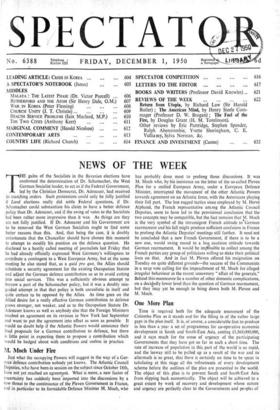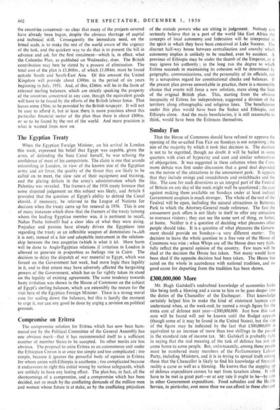One More Plan
Time is required both for the adequate assessment of the Colombo Plan as it stands and-for the filling in of the rather large gaps in the plan itself. It is, of course, a considerable feat to produce in less than a year a set of programmes for co-operative economic development in South and South-East Asia, costing £1,868,000,000, and it says much for the sense of urgency of the participating Governments that they have got so far in such a short time. The rate of increase of population in this part of the world is so rapid, and the leeway still to be pulled up as a result of the war and its aftermath is so great, that there is certainly no time to be spent in tabulating at this stage all the refinements of every development scheme before the outlines of the plan are presented to the world. The object of this plan is to prevent South and South-East Asia from slipping back economically. The object will be achieved to a great extent by work of recovery and development whose nature and urgency are perfectly clear to the Governments and people.; of the countries concerned—so clear that many of the projects covered have already been begun, despite the obvious shortage of capital and technical skill. Consequently the immediate need, on the broad scale, is to make the rest of the world aware of the urgency of the task, and the quickest way to do that is to present the bill in advance and ask for the first instalment—which is, in effect, what the Colombo Plan, as published on Wednesday, does. The British contribution may best be stated by a process of elimination. The total cost of the plan is f1,868m., of which 11,084m. must be found outside South and South-East Asia. Of this amount the United Kingdom will provide about £300m. in the period of six years beginning in July, 1951. And, of this, £246m. will be in the form of released sterling balances, which are strictly speaking the property of the countries concerned in any case, though the equivalent goods will have to be found by the efforts of the British labour force. That leaves some £50m. to be provided by the British taxpayer. It will not be easy to afford it, but at least there is more precision about this particular financial sector of the plan than there is about £800m. or so to be found by the rest of the world. And more precision is what is wanted from now on.







































